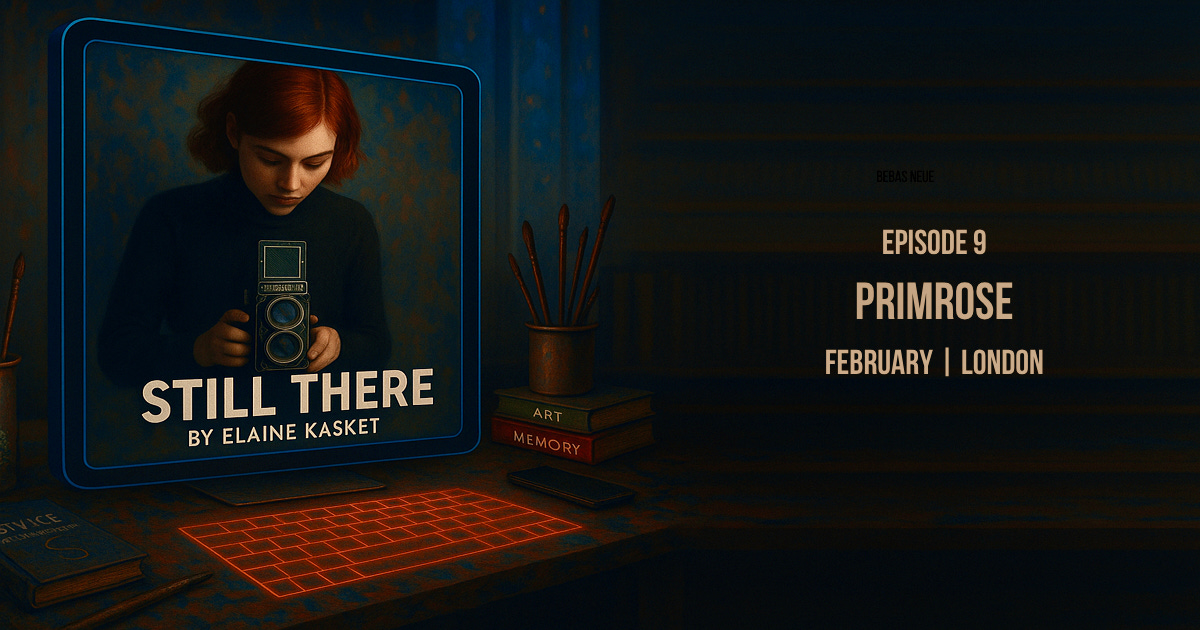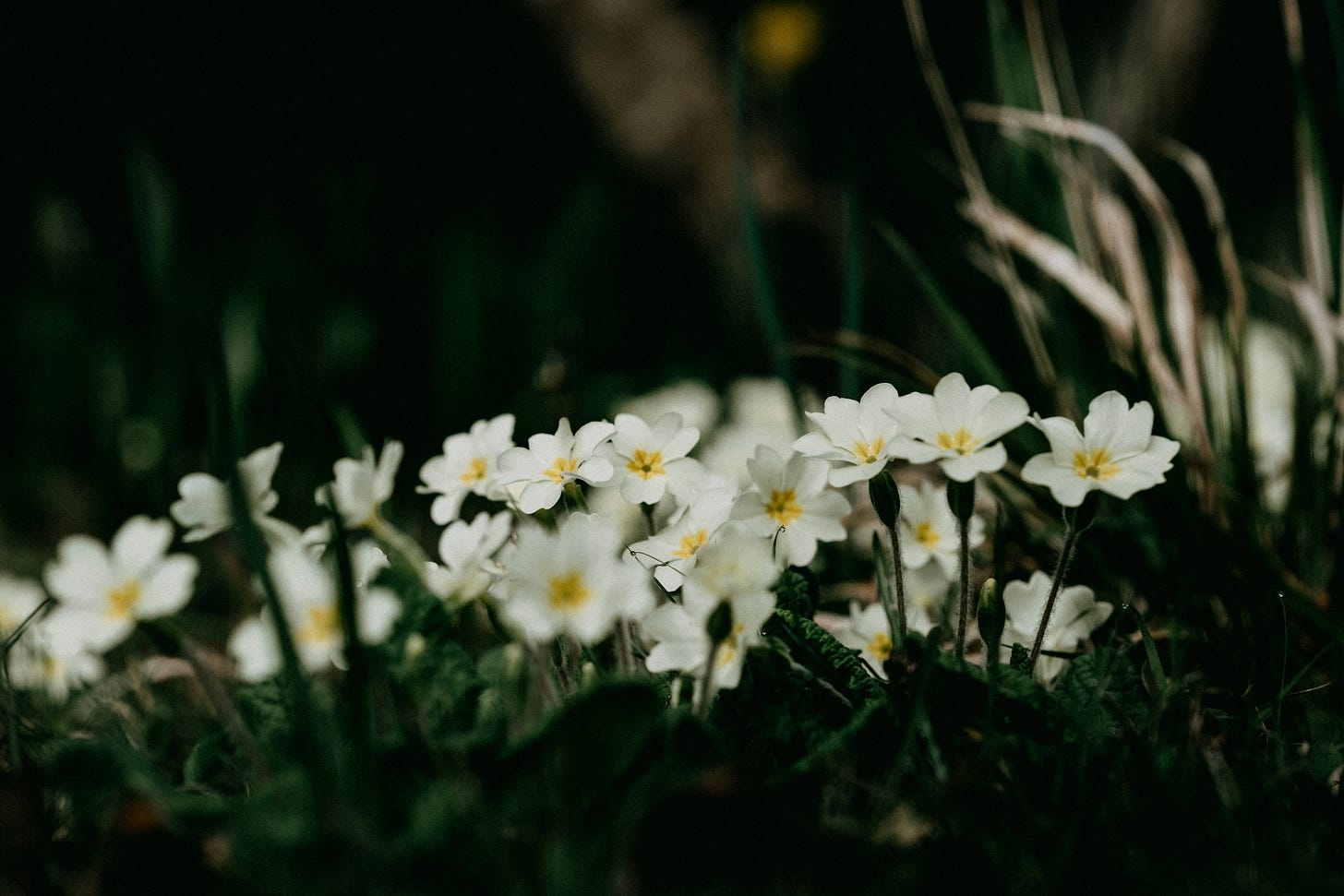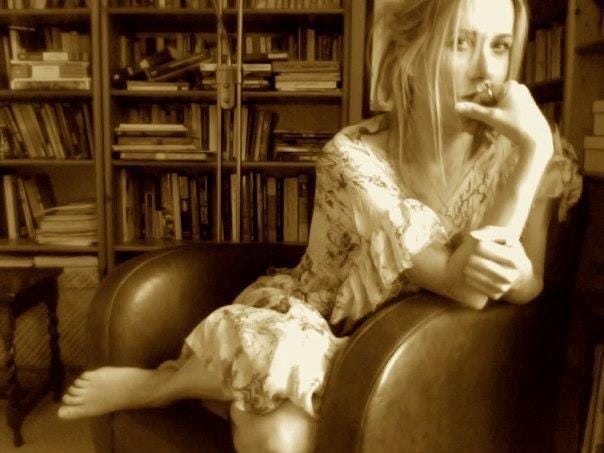Eleanor’s office was the same as ever. The Victorian black-and-white chequerboard walk, now lined along its edge with spring primroses. The chipped paint around the lock of the door. The herringbone-stitched velvet cushions on the sofa, the seams of which Cassandra had always picked at with her fingernail when she felt nervous. The cosy space heater, situated quite close to the corner of the sofa where she liked to sit. The ceramic bowl of striped agate pebbles on the side table. The therapist, a woman of indeterminate age who could have been anywhere between 45 and 70, radiating the reassuring impression that nothing anyone said could possibly surprise her, and that furthermore she would nonjudgmentally accept any sorry or shameful tale that was spooled out before her.
Photo by Annie Spratt on Unsplash
Nevertheless, over the years that she’d visited the therapist’s office in intermittent intensive bursts of sessions, Cassandra had chosen to hold plenty back from Eleanor. She’d spoken of her anxiety as though it were a free-floating, diffuse phenomenon, hitting without warning and triggered by nothing in her environment that she could discern. She said that the bouts of depression, when they came over her, were like a heavy blanket, something that would just be there suddenly upon waking up in the morning, preventing her from getting out of bed. Sometimes Eleanor had asked her about her sense of meaning and purpose, questions likely intended to mobilise more action, but which instead only generated shame that she had not done more.
Cassandra described Paul, when she spoke of him, as supportive, as wanting her to feel better. Ever since he’d come into her life, at a difficult time, she’d said, he had always been there for her.
‘It’s been a while,’ Eleanor said as they settled in. ‘So, tell me. Why now?’
Cassandra couldn’t recall Eleanor ever starting out their previous tranches of therapy like this, with this unflinching, incisive inquiry into why this moment. What had she said before? What’s happening for you, maybe, or what’s bringing you in.
‘As I think I told you, ah, my friend died suddenly. My good friend, Olivia. Liv.’
‘I’m so terribly sorry,’ said Eleanor simply, with what seemed like genuine warmth and sincerity.
On the wide mantel above the old fireplace in the consulting room sat a very old clock, set within an oak case and featuring beautiful, curving art nouveau style numbers on its face. The sound of chimes had been disabled, but the clock ticked as the pendulum swung back and forth, punctuating the silence.
‘I’m not sure that that’s what I most need help with, though,’ Cassandra said, wondering if she’d be forced to speak about it regardless, if any shrink would think her reluctance to speak about Olivia was unhealthy.
‘That’s okay,’ Eleanor said evenly, and Cassandra remembered that when she’d come here after her father’s death, pressure to speak about anything at all hadn’t been Eleanor’s style.
‘Okay.’ Cassandra bit her lip and nodded, then kept nodding, like a bobble-headed toy on a dashboard. She hadn’t felt this scared in a long time. She couldn’t imagine what would happen if she spoke about it, and her inability to picture it was keeping her stuck.
Eleanor made no move to prise it out of her but sat relaxed and undemanding in the chair across from her, telegraphing that she was in no hurry and there were no expectations.
‘I want to start painting again,’ Cassandra said. ‘Maybe even…seriously.’
‘Mm!’ Eleanor said, her tone interested and upbeat. Despite Eleanor’s studied neutrality, Cassandra had always suspected that the possibility of her starting to create again was a point on which her therapist was not entirely neutral.
‘I’m not planning on stopping the tutoring. What little tutoring I do. But I need to make a change,’ she continued. ‘That’s probably what I need the most help and encouragement with now. Accountability. Maybe it’s not appropriate for therapy – maybe it’s more a matter of coaching. You can tell me.’
Eleanor had a range of ‘mms for different moments. ‘Mm,’ she said, curious and thoughtful this time. ‘How long have you felt this way?’
‘Not long.’
‘A resurgence,’ Eleanor said mildly. ‘At this moment.’
Cassandra flushed. She knew she’d not technically been asked a question – her therapist rarely used the word why. ‘I suppose people commented, at the wake,’ she said. ‘My portrait of Liv was there. Then her husband featured it on the memorial site. But I think what really motivated me was…hm. A conversation.’
‘A conversation,’ the therapist repeated.
Cassandra’s face was hot, as though it might be red. On pretence of tucking an errant curl behind her ear, she brushed the back of her index finger against her cheek to check its warmth. The clock ticked. She suddenly pictured her phone, lying dark but still powered on in the handbag that sat at her feet.
‘Sorry,’ she said. ‘Is there somewhere else I could put my bag?’
Eleanor nodded and swept her hand across the space, indicating Cassandra’s freedom to place it anywhere she chose.
‘Could I possibly put it…outside the room?’
‘If you like,’ said Eleanor. ‘There’s no one to disturb it in the hallway. Would you like to talk about why?’
Cassandra shook her head. ‘I’m probably just being silly,’ she said, but still she took a moment to take her bag outside, closing the door softly behind her as she returned. ‘Where was I?’
‘You had a conversation,’ replied Eleanor.
‘I spoke with someone I didn’t know. Online. It’s unusual for me.’
Eleanor maintained her gentle, receptive silence for a time, but Cassandra was frozen, unsure what more she should say about her encounter with Alex. ‘This conversation was…impactful in some way?’ Eleanor asked eventually.
‘Maybe when a stranger notices something about you, or appreciates something, it means more,’ Cassandra said, shifting in her seat. The other woman nodded but did not reply.
Cassandra decided, silently, not to reveal any more about Alex that day.
‘Olivia was young,’ she said instead. ‘Too young to…too young for what happened. Back in the day we cared about things in the same way. Passionately. And she never stopped working. If anything, she made more work, after she got married. But I…I don’t know. I don’t know what happened.’
Wary of meeting Eleanor’s gaze, she studied a cushion lying on the sofa beside her, running the nail of her index finger up and down the zipper concealed under one of its seams.
‘I do want to start again – it’s starting to feel weirdly desperate, actually – but I don’t really believe I’m going to do it.’
‘Let’s say you make this happen,’ she heard Eleanor say, after a time. ‘You conquer your hesitation, take up painting seriously, and, if I’m hearing your hope correctly, make it part of your career again. You do it. What would that be like?’
The question seemed obvious, and Cassandra shrugged. ‘I mean, it would be wonderful if I were able to do that,’ she said, pivoting her eyes away from the cushion towards the other woman. ‘Of course, it would be good, better than good. But even getting the studio…’
When Eleanor held up a finger, she stopped.
‘Okay,’ the therapist said. ‘You’ve done it, and it’s good, better than good. How is it bad?’
‘I don’t understand,’ Cassandra said, confused.
‘Having known you a long time, having known how it’s felt for you to not create, I have no question in my mind that when you do this, it will feel good,’ Eleanor elaborated. ‘My question is, how might transforming these hopes into your reality also prove bad?’
‘I don’t…’ she began again, and Eleanor’s interruption was kind rather than sharp.
‘Sit with it a moment,’ she suggested.
Cassandra sat with it, the realisation dawning that if she were ever to change anything, she would need to become more straightforward with Eleanor. But the more radically honest words stuck in her throat.
‘It could affect my relationship with Paul,’ she said, and even the lukewarm version of the truth felt dangerous to voice, so risky that she wanted to backpedal. ‘He can be supportive,’ she continued. ‘He and his father built me the studio, years ago. But if I took it up in earnest again, I think he’d be threatened.’
‘Threatened?’
Cassandra nodded. Butterflies began whirling in her stomach, and she placed a palm atop it. She snorted softly, a little wry laugh. ‘Furious, even.’
If Eleanor was at all surprised, she did not show it. ‘Furious, even,’ she repeated. ‘And then?’
‘And that wouldn’t be good,’ she said.
‘Mm,’ the therapist replied, and this time she sounded serious and a little bit sad. ‘You’ve said very little about your marriage over the time we’ve known one another. But I’ve sensed that you make many of your decisions with a keen awareness of what might make him comfortable or uncomfortable. Please correct me if that doesn’t sound right.’
‘Don’t most married couples do that? Adjust according to what the other wants?’
Eleanor shrugged. ‘To a lesser or greater extent,’ she replied.
Cassandra squirmed, suddenly uncomfortable herself. ‘Could you help me set some goals for getting the studio in order?’ she asked. ‘That would be so useful.’
Eleanor cocked her head slightly and squinted at the mantelpiece clock, then at her client. She turned her palms upward and towards Cassandra. ‘We can do whatever you like,’ she said.
So they discussed nuts and bolts: how she could rejuvenate the studio, what cleaning needed to be done, the necessity and pleasure of ordering new paints and fresh brushes, the type of technical setup she would need not just for her tutoring but also for playing music in the studio, designing a website, running a business – even if she were not ready to think about that yet.
Cassandra said she wouldn’t feel comfortable using the joint account, that Paul would balk at the expenditure, and that she had a little money put by, savings from her tutoring and what was left of some inherited money.
‘Are you sure you can spare it, that you won’t need it for anything else?’ Eleanor said gently. Cassandra gave it a moment’s thought.
‘I don’t think I will,’ she said. ‘And I want to use it for this.’
‘What’s first up?’ Eleanor said. ‘What do you want to be accountable for next time?’
‘Researching the computer, at least. Possibly even purchasing.’
‘Mm!’ confirmed Eleanor. ‘Sounds reasonable. Anything that might get in the way?’
Cassandra laughed without knowing why. ‘Only Paul, probably,’ she said.
Eleanor gazed at her for a moment, her elbows propped on either arm of her chair and her fingers interlaced at the level of her chest. She blinked her eyes slowly closed, like a sleepy cat, dipped her chin to rest on her hand, and then tipped it up again, opening her eyes and searching an upper corner of the room as though she were looking for spiders’ webs in the corner.
‘May I offer something? An invitation?’ she said finally, dropping her gaze to meet Cassandra’s again.
‘Of course.’
‘For the overall grounding of your therapy at this moment, I think a particular exercise might be useful,’ Eleanor said, the slowness of her speech making Cassandra think she was choosing her words carefully. ‘Not just for me to understand more, but for you as well. I’d like to understand more about how your relationship with Paul frames your choices.’
Cassandra tugged at the zipper of the cushion between thumb and forefinger, flicked it back and forth once, twice. ‘I suppose I’m curious about that too,’ she said. ‘What do you…’
‘I’m wondering about kind of timeline,’ Eleanor replied, a rare instance of her talking over Cassandra. ‘It can be as simple or as elaborate as you like – but it could be a timeline of important moments or decision points in your life, in the context of your romantic relationships. Not just with Paul. With whomever might have preceded him. Might you be willing to engage with something like that?’
‘Do you mean write it down?’ Cassandra said cautiously. ‘Um, hm. I’m not sure. What if…I’m happy to do the exercise. But I feel funny about writing it all down, especially on the computer in the house, or on my phone…I don’t know.’
She thought she saw Eleanor’s brow furrow slightly, not in disapproval but maybe in concern. ‘Mm,’ she said. ‘If you’re willing but don’t feel able, we don’t have time to unpack that further today. But here’s a thought.’ She went to the antique desk in the corner and rummaged in a drawer, withdrawing a sheaf of paper, and a pre-stamped large letter envelope.
‘I like writing in longhand,’ Cassandra said, ‘but I don’t remember the last time I posted anything.’
‘None of this is required,’ Eleanor reassured her, plucking a pen from a cup on the desk and inscribing her office address on the front of the envelope. ‘Although I’m also giving you a form to update your details and sign for me. Please do send that through, if nothing else. Don’t feel pressurised.’ She paused. ‘And don’t take any risks.’
‘Risks,’ repeated Cassandra.
‘Mm,’ Eleanor said again.
In the next episode, Cassandra goes back in time to try to understand how she became quite so stuck in her situation, and a development with Paul gives her a foretaste of just a little bit of freedom.
Click the button to subscribe, restack this post, and/or tell a fiction-loving friend about Still There. The more the merrier as the story unfolds.
About the Author
Elaine Kasket ventures into new territory with Still There, her first novel. Known for her nonfiction work, she's now exploring the boundaries between memory, technology, and human connection through fiction. This serialised novel is being released exclusively on Substack, with new installments dropping every Tuesday and Friday. Join the journey from the beginning, and subscribe to make sure you don't miss a single episode.






